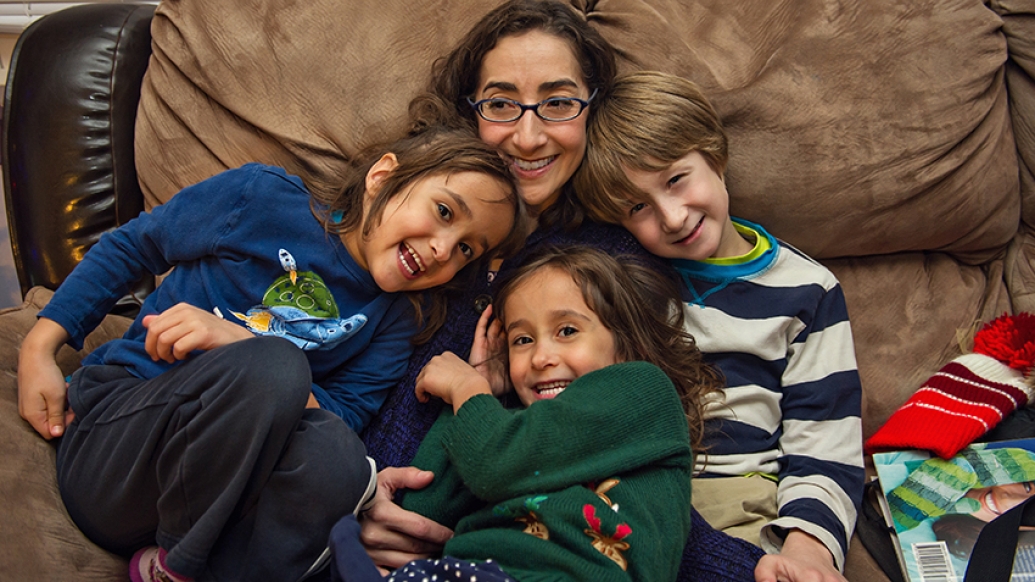One woman’s intuition helped her seek testing for a rare genetic mutation that ultimately guided an effective course of action against her cancer.
7:00 AM
Author |

After unshakable colds and a lingering cough led to trouble breathing, Tori Tomalia, an otherwise healthy 37-year-old — and a lifelong nonsmoker — was diagnosed with stage 3.5 non-small cell lung cancer (NSCLC). Her disease soon progressed to stage 4 and spread beyond her lungs to her bones, liver and brain.
MORE FROM MICHIGAN: Subscribe to our weekly newsletter
No stranger to cancer, Tori was treated and cured of osteogenic sarcoma, a type of bone cancer, as a teenager.
But she was unprepared to hear the word again.
"To say I was in shock is an understatement," the Ann Arbor, Michigan, resident recalls. "I was terrified. It took about a month to even absorb it."
Initially, doctors suspected a connection between the two cancers, but tests revealed no link between Tori's childhood cancer and the new diagnosis in May 2013.
Aggressive chemotherapy was the first line of defense and proved highly effective in reducing her main lung tumor and bone metastases. Doctors then tested biopsied tumor tissue for genetic mutations known to drive NSCLC, but no link was found between Tori's cancer and the usual suspects.
Acting on 'a hunch'
Tori wasn't satisfied with the inconclusive results.
The married mother of three young children recalled her frustrations in a post on her blog.
"When I was diagnosed with lung cancer, I dove into the research and tried to learn everything I could about this disease," she wrote. "Actually, that is not quite true. For the first few weeks, I actively avoided reading anything about it. I knew enough to understand how dire it was. I couldn't face seeing it in black and white. Eventually, I took a deep breath and started reading."
Her extensive research generated a list of other less common mutations to explore. But since only a small tissue sample was available from the biopsy, she and her doctors decided to continue treatment and follow up with more testing if and when her cancer started growing again.
Still, something nagged at her.
"Then it dawned on me: There isn't enough tissue left to test for a dozen mutations, but I bet there's enough to test for one," Tori wrote. "I emailed my oncologist and asked if we could test for the ROS1 mutation. I had a hunch."

Moving forward
Her hunch proved to be the needle in the haystack.
Only 1 percent of NSCLC tumors — Tori's included — are driven by the ROS1 mutation. Hers was the first tumor to ever test positive for ROS1 at the University of Michigan Rogel Cancer Center.
A cutting-edge targeted therapy called Xalkori (crizotinib), shown effective in attacking cancers driven by ROS1, became her new treatment regimen.
SEE ALSO: How Cancer Genetic Testing Can Save Lives
So far, the medication has worked.
"I take a pill twice a day; I've done so for three years now," she says. "It's worked amazingly well. My liver is clear, and it took care of my bone metastases."
Although she has no symptoms from the cancer, Tori notes that the drug is not without side effects, including fatigue and a range of gastrointestinal issues.
"I've developed a million tricks for managing them," she says. "You'll never find me without Imodium in my purse!"
While crizotinib has kept Tori's cancer in check, it is known to have one significant limitation. The drug is made up of molecules too large to permeate the blood-brain barrier separating the blood that circulates around the brain from the fluid in the brain and spinal cord. It isn't effective on cancer that has spread to the brain.
Which is why Tori has twice been successfully treated with stereotactic radiosurgery, a type of radiation therapy, to target and destroy cancerous cells in her brain.
"There is currently a clinical trial of a second generation of crizotinib designed to be effective in the brain," she says.
That's seemingly good news, since about half of patients with ROS1 mutations see their cancer progress first to the brain.
Meanwhile, Tori's most recent three-month check-in at the cancer center showed no change in brain metastases — more positive news helping to bolster her continued fight.
"For now, we're very thankful that we can keep going on the treatment path we're on," she says.

Explore a variety of health care news & stories by visiting the Health Lab home page for more articles.

Department of Communication at Michigan Medicine
Want top health & research news weekly? Sign up for Health Lab’s newsletters today!





